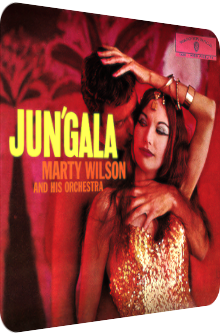
Marty Wilson
Jun'gala
1959
Jun’gala by composer and arranger Marty Wilson – not to be mixed up with Stanley Wilson of Pagan Love fame – is an orchestral Jungle Jazz work of tropical dimensions and released in 1959 on the Warner Bros. label. Sporting ten compositions, with four of them written by Wilson, Jun’gala is a particularly convincing work, triggering all the right synapses of an Exotica fan’s mindset and desires. The arrangements feature a vast amount of drums and percussion which are as ubiquitously used throughout the work as they are exotic: bongos, congas, guiros, maracas, djembes, timbales, everything is on board, and then some. In addition, Wilson includes fully fleshed out Space-Age strings and a large brass section, making it one of those rare orchestral albums that feature string strata, brass layers and perpetual percussion placentas. Only a choir is missing, but this is nit-picking, as Jun’gala otherwise has it all, be it gorgeous melodies, renditions of gold standards or multifaceted tempo shifts.
And yet, before I dive deeper into the aural jungle, there is something strange about this work, making it one of the few instances I cannot grasp in its entirety: Jun’gala’s lack of fame. Granted, die-hard Exotica fans tend to show a behavior known as selective perception. I am definitely harmed by this psychological phenomenon. To me, Exotica (and, unsurprisingly, Ambient) are elixirs of life, potions transformed into sound waves and escapist flumes which lead to light, delight and enlightenment. It is true that Exotica in general and the tiki movement in particular have experienced a resurrection, a large boost, resulting in CD reissues and digital-only incarnations more often than not. It’s paradise! But that very boost is not large enough to convince all rightsholders and listeners alike, and so Jun’gala remains curiously under the radar despite its striking qualities. Take, for instance, Frank Hunter’s one-off Exotica stop White Goddess (1959) into account: it is as aesthetically pleasing and languorous as Marty Wilson’s work, but Hunter somehow managed it – albeit posthumously so – to make this very work a legend. It has been reissued, is frequently mentioned throughout the web and incidentally one of AmbientExotica’s most-often read pieces! Jun’gala by the (even) less known persona of Marty Wilson is largely ignored. I cannot change this perception all by myself, but at least give honor where honor is due. Here is the first meticulous look at a stellar work that was denied its status as a cult classic long enough.
No time, no time at all, the time-related boundaries of vinyl prevent sophisticated setups, and Jun’gala already possesses “only” five tracks per side. It is only consequential that the opener and Exotica standard Jungle Fantasy by Esy Morales kicks off in the true sense of the term, with siren-like two-tone brass eruptions, Pagan flute aortas and maraca-fueled bongo patterns. The reverb of the flute hints at a wideness in the otherwise punchy attack rate. An admixed Latin piano rounds off the rapidly firing shrapnel of verdured tendrils. A great opener, Crime Jazz-influenced and wondrously shady. Margarita Lecuona’s crestfallen anthem Taboo is next, and Wilson’s orchestra unsurprisingly goes all-in on a downbeat whose djembe-underlined rhythm is heavily illumined by mysterious polyphonic-fuzzy flutes, Space-Age string washes and pizzicato interruptions. It is a great arrangement which even manages to sneak in comic relief in the centroid segue where brazen polka dots are injected.
Up next is Marty Wilson’s own Misty Poo (come again!?), a sun-dappled Mambo. The brass flourish twirls upwards, a dirty saxophone leads the way through the flute- and tonewood-based jungle. The middle section introduces a Bossa Nova rhythm with a more clanging percussion backdrop and nostalgic flute intertwinements which then lead to a frantic tachycardia-causing breakneck tempo. Misty Poo is a surprisingly good tune: polyhedric, spheroidal and varied yet coherent. Whereas Passion introduces romance for the first time qua its rose-tinted flute-and-string concoctions, overall soothing appeal and cleverly injected spiraling tones, Xavier Cugat’s Enlloro is the expected percussion corker, moulded into an upper midtempo gestalt of large-grained maracas, euphonious brass formations and a sunny atmosphere before venturing into a tenor sax-augmented frenzy of percussion prowess. Side A ends with a bang and proves to be chock-full of hits.
Side B, meanwhile, is no different in this regard. Launching with the second corker of Margarita Lecuona’s feather, the besotted Babalu, it depicts a duality of pristine purity and Cha Cha concourses traversed by croaking guiros and sequences that shuttle between fiery portent and inviting benignancy. Marty Wilson soon moves to Earle H. Hagen‘s and Richard Rodgers’ Harlem Nocturne which sucks a Jazz standard in and exhales… Exotica. The moon-lit Space-Age string sections shimmer in ashen light, the vesiculating flutes are the insouciant counterpart, and aqueous-cosmic claves add a welcome textural anomaly to the aura.
This superb take is complemented by two unique Wilson tunes: while Les Champs De Cuba is a flute-heavy, horn-backed midtempo Exotica tune which enchants with its streamlined yet gorgeously arranged big band segue that becomes enmeshed with the laid-back Latin percussion fluxion, Yumba Marumba’s physiognomy is similar, but sees its percussion underbrush extrapolated and its flute-focused melodies transformed into bucolically bubbling carefree spirits, making it the catchiest tune… by Pop standards. The finale takes the listener back to where the album comes from: California, or to be more precise, Manteca. Composed by the quartet of writers Chano Pozo, Dizzy Gillespie, Gil and Walter Fuller, it is a Latino belter with guiros, maracas, bongos, timbales and warm – albeit acidic – brass protrusions amid archetypical piano accompaniments.
Jun’gala is emerald gold, a trippy journey into the rain forest and one of the comparably few records whose arrangements are able to transmute the Latin sinews and vestiges into prime Exotica material. The percussion thicket is as important – sometimes even strikingly so – as the common stringed and brass instruments. And yet these devices succeed as well. Taboo, for instance, may not outshine Les Baxter’s masterful rendition included on Caribbean Moonlight (1956), but it does feature Space-Age strings and an enthralling luminescence, so everything is perfectly fine. The standout piece, objectively speaking, is the wittily titled Misty Poo. Not only is this an original product, it also showcases four different rhythms and movements and could thus be considered four pieces glued together as one. It is also a rather experimental composition, as it wanders aimlessly and erratically through the jungle, but this is the only instance of a delightful ignis fatuus in an otherwise perfectly carved out project.
Blending Latin music with Exotica on the one hand and marrying the percussion of quartets or quintets with symphonic and big band structures on the other hand, Jun’gala is one Exotica work to own. Even those listeners who have a very narrow or focused viewpoint in regard to Exotica – fair enough – ought to agree with that genre label. There is only one heart-breaking, hopefully interim drawback to mention: Jun’gala has never been reissued, not even in purely digital form. It is one of the many crimes in the Exotica genre that every judge will laugh down or elbow away and no court would ever care to discuss, but which hurts the devoted fan and listener. I severely hope it will be reissued some time in the future. Let that future be now.
Exotica Review 309: Marty Wilson – Jun’gala (1959). Originally published on Jan. 25, 2014 at AmbientExotica.com.
